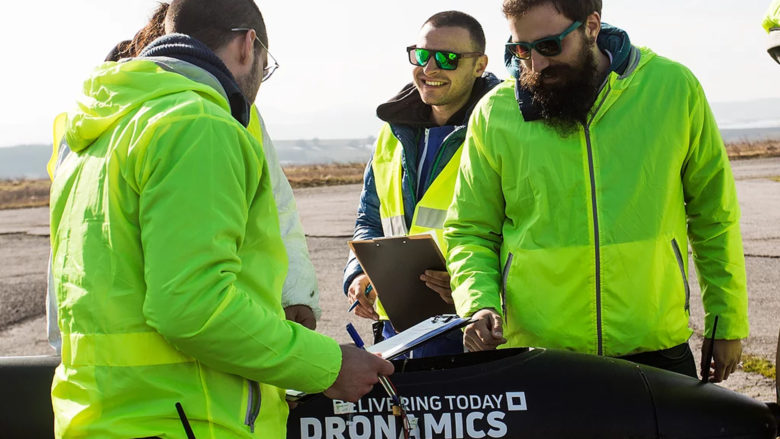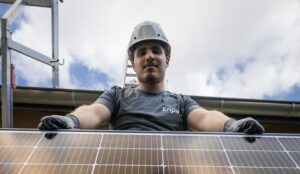Startups In Times Of Crisis Vol. 8: A Black Swan And The Black Swan Of Dronamics

Which startups won’t make it and which will go out of the crisis as winners. Events industry, travel, leisure, real estate, hardware, are the hardest hit sectors. Yet does it apply to the startups in these industries? Do tech startups stand the chance of losing the game for not having the financial resources to sustain, or will make it because they are flexible and adaptable? We ask founders from the most affected sectors.
There’s not much air traffic ever since the coronavirus outbreak. Companies around the world are concerned about their supply chains. “Airlines in Europe suffered a sizeable decline in year-on-year growth in total air cargo volumes already in February 2020, while North American and Asia-Pacific carriers experienced more moderate falls. The Middle East, Latin America, and Africa were the only regions to record growth in air freight demand compared to February 2019,” reads a report by the International Air Transport Association (IATA). “We only got a first glimpse of this in February. Among all the uncertainty in this crisis, one thing is clear—air cargo is vital. It is delivering lifesaving drugs and medical equipment. And it is supporting global supply chains. That’s why it is critical for governments to remove any blockers as the industry does all it can to keep the global air cargo network functioning in the crisis and ready for the recovery,” said Alexandre de Juniac, IATA’s Director General and CEO, in an official announcement.
Ever since the outbreak and the lockdown, drones are becoming a hot topic again – “pandemic drones” fitted with sensors are flying in Connecticut detecting people with symptoms, in Ghana, COVID-19 tests are being delivered by unmanned aircraft, UPS and Google are also testing drones for last-mile delivery. And reading all this news we began wondering what’s with Dronamics, the cargo drone startup?
Dronamics was founded in 2014 to democratize air shipping at a lower cost. The company has developed a fixed-wing cargo drone – a UAV with a wingspan of 16m that will be able to carry up to 350 kg over 2.500km at 200 km/h speed. It’s designed to carry goods between cities and countries (not the last mile to the consumers – ed.n.), and could be serviced at any airport as it has a standard gasoline engine. It would have been great if the world had it before the whole virus outbreak, right? Well, Dronamics has a prototype at a 1:4 scale and has been working on the full-scale drone called The Black Swan in the past two years. Alongside the engineering, CEO Svilen Rangelov has been traveling the world to negotiate with clients, partnerships, and VCs. Partnering with IATA is one of the great achievements of the startup.
The broad audience hasn’t heard much from Dronamics in the past year. The truth is when they started the whole thing six years ago, there was a momentum around drones, yet the investors’ appetite dropped at some point and The Black Swan has always seemed to be a bit ahead of time, so funding the R&D was hard so it all went slower. Maybe now the time has come though. Indeed in the last months, they opened up a new production facility, received angel investment, and continued negotiating with partners and clients. So, we thought this might be a good moment to take a look at their development – not least, it’s quite possible that the new order of the world has put companies like them in the spotlight and attracted the investors’ appetite again.
Trending Topics: We haven’t heard from you for a while. What are the most significant milestones in Dronamics development in the past two years?
Svilen Rangelov: The past two years were quite exciting and truly established us as the leader in the emerging industry of unmanned cargo drones. We made a number of significant breakthroughs in our development, we validated them successfully with a variety of prototypes, built mobile ground stations, and confirmed our performance and communications. Meanwhile we also greatly expanded our production capacity – building effectively our first micro-factory right next to Sofia Airport, which has enough space to build between 4 aircraft simultaneously, depending on the configuration, and where we’re going to be building our first batch of commercial units until our larger factory is set up. On the business side, we became IATA’s first Strategic Partner for drones worldwide and partnered with a number of big corporations for our first service, including EasyJet in the UK and leading couriers and e-commerce companies in Europe.
Where was the company one month ago and what was on the agenda for 2020 back in February?
We have a number of things on our agenda for this year, and they haven’t changed, if anything, the events of March 2020 actually accelerated them.
Is the current COVID-19-related situation affecting your plans in some way? How?
We had a few business trips postponed, and we closed the office for a week when the emergency was first declared in Bulgaria primarily to see how it will evolve and to let our teammates make preparations at home for the new reality. Other than that it was uninterrupted.
What’s your biggest concern? What’s the biggest opportunity you see in the situation?
My biggest concern is that the longer this war goes on around the world, the more parts of our life it will destroy, so we really don’t have much choice but to find a vaccine as quickly as possible, and in the meantime to do our best to try to limit the damage. Who would’ve thought that World War III would be between our species and a quasi-life form and that our best weapons would be social distancing and soap! So, I support the strict measures governments have taken and I applaud how many people are taking this seriously and are following orders, even if they are more than inconvenient, because these aren’t ordinary times and we cannot treat them as such. It’s great to see how many people instinctively understand that what we’re all trying to prevent a collapse of our healthcare systems, and it’s inspiring what lengths people would go to join the battle and fight for us all. I’m sure everyone sees examples of this kind of bravery and stoicism in their own communities and we have to draw our strength from those. The biggest opportunity is that we are all going through one of the biggest forcing functions of all – and it’s having us rethink a lot about everything – from environment, to healthcare, to government’s role in the economy, to education, to our personal responsibility. And it’s also creating a huge amount of shared experience among countries and cultures, so I actually believe in this case distancing and border restrictions actually bring us closer together.
Aren’t drones one of the sectors that are supposed to be boosted by the current crisis?
You are right, on a business level, the COVID-19 situation made a lot of people realize that a solution like ours would have been invaluable right now, because supply chains everywhere are severely disrupted. So interest has really surged and made our solution very relevant and needed, although I really wish this wasn’t the occasion that triggered it. The trend of faster and uninterrupted transportation was always there, it’s just much more acutely visible now. In our sector you see passenger airlines ripping out seats to carry cargo on the main deck, others flying seats empty with cargo only in the belly, and yet some that have found a way to even fit boxes on top of seats. People are doing anything they can to keep global supply chains going, and that’s pretty fascinating and inspiring – our adversary may be deadly and invisible, but humans can always win with spirit and resilience. This means the virus is doomed and that we can’t lose, so we’re not allowed to give in, and therefore we should actually fight harder.
Will the current situation help the regulation in the sector speed up or on the contrary?
On a strategic level – yes, it’s speeding up – regulators and policymakers also see more clearly now the benefits drones can bring, especially in situations when whole cities and towns are quarantined. Plus, right now both air risk and ground risk are lowered – you have fewer flights so the airspace is quite empty, and shelter-in-place restrictions, so the streets are also quite empty. I am sure even smaller delivery drones, which are inherently a lot riskier as they have to navigate complex urban environments and have lower reliability levels because they’re just small, will get some waivers.
How are you navigating through the situation? On the one hand, your R&D is very capital intensive, on the other – your business development is dependent on traveling. Any specific measures that you’ve taken?
I’ve always tried to be an optimist, so I instinctively look for the silver linings. On a practical level, yes, we used to travel extensively, since our customer base is almost exclusively outside of Bulgaria, but with the restrictions in place, we’ve switched to a lot more video and conference calls, which is not necessarily a bad thing, especially with the number of relationships we had already established. In terms of manufacturing, our micro-factory is “micro-” only when compared to the bigger factory we’re working on, but it’s actually not that small, so social distancing was not hard to implement on-site. Still, we stick to remote work for whoever can and strict distancing and disinfection protocols on-site for whoever can’t. In many ways, we were prepared sooner than others because I had traveled to China in mid-January just before their lockdowns and saw the warning signs early.
You’ve been fundraising in the past year. How is the current situation affecting this?
We are closing a round, but the situation has also increased the interest in us from investors, as more of them realize how close we are to market. Some outstanding partners have joined us but I’ll be able to share more soon.
Do you have enough cash to make through the next three-six months?
Yes, and a lot longer than that too.
Were there any quick decisions and adjustments that could be made?
No, actually we’re hiring and growing, not downsizing.
How about the long run? Has the current situation changed the plans?
It has accelerated them greatly – time to market, market potential, investor pool, all of it. Again, I really wish this wasn’t the occasion, and that more people saw what we saw earlier, but it’s just easier to put it all in perspective now, and we can’t ignore this rising tide.
This may also interest you:
Vol. 2: Housing Tech, Gaida.ai And Setting The Rules Of The New Upcycle
Vol. 3: Events Industry And Evedo’s Pivot
Vol. 4: Airlines Industry and Traveltech startup Colibra’s new financial product
Vol. 5: E-Scooters, Big Players On Hold And Newcomer Hobo’s Attempt To Stay Afloat With B2B Packages




























